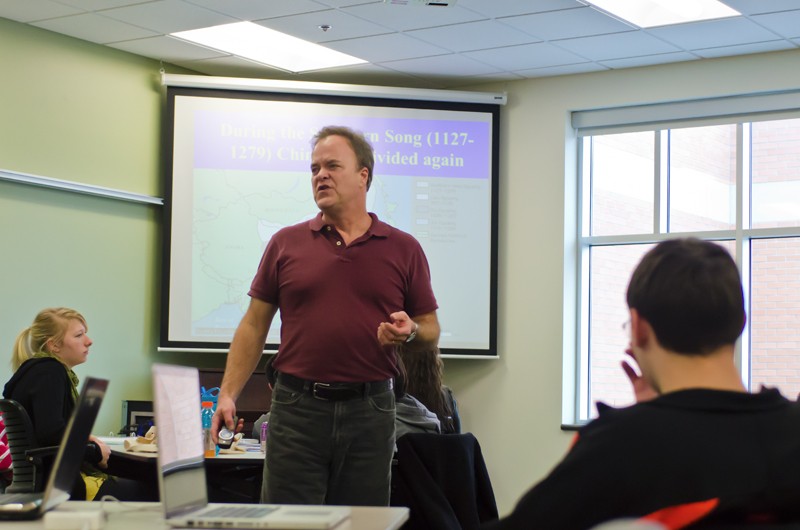GVSU hosts international history organization’s office

GVL / Bo Anderson Craig Benjamin instructs his East Asian Civilization Honors course.
Feb 16, 2012
Thanks to innovations and advancements in GVSU’s Big History course, which covers world history from the Big Bang all the way to the future, Grand Valley State University is one step closer to worldwide recognition.
Next year, history professor Craig Benjamin will be pioneering an interdisciplinary honors course on “Big History,” in which many guest professors will provide insight into different fields of study.
“It’s the first time Big History has ever been taught this way anywhere in the world,” said Benjamin, who has taught Big History at GVSU for nine years and serves as the treasurer of the International Big History Association. “Students will get the Big History story in a connected narrative way from me, but then we’ll have these leading specialists talk about current issues with evolution, or current thinking about dark matter and dark energy and students will get that really specialized intensive look at that, as well.
“It covers almost all the disciplines you can imagine. It connects all the knowledge that we know about the history of the universe, of stars and galaxies, our planet, life on earth, hominid ancestors, human history into a single fluent connective narrative story. All the way from sort of grassroots levels, the impacts on students lives, right through the impact at sort of global, economic levels and political levels.”
The new course, alone, will not attract international attention, but coupling it with GVSU’s involvement in the IBHA could.
Of all the well-known universities and institutes in the world, the IBHA chose GVSU’s Brooks College of Interdisciplinary Studies as its headquarters last year.
The association has members from Australia, Egypt, Canada and a number of other countries around the world, and members hail from prestigious colleges like the University of California-Berkeley. However, GVSU now serves as its home.
“At first we thought, ‘Well, should it be somewhere more famous?’ you know, because we got colleagues from Berkeley and California,” Benjamin said. “But the more we thought about it and the institutional support we had here, the more Grand Valley made more sense: halfway across the country, sort of convenient, beautiful university anyway, so in the end we just had a vote and the vote was ‘Yeah, if Grand Valley’s willing, let’s make that the home-base of the International Big History Association.’”
Benjamin said the organization held its first meeting at GVSU last January to establish bylaws and the articles of association, and it now retains an office in Lake Ontario Hall, which the university supplies at no cost.
“We want to have this on our campus,” said Wendy Wenner, dean of Brooks College. “It’s prestigious for Grand Valley. It really gives us a national presence by having this worldwide association for Big History located on our campus. Grand Valley wants to be part of the bigger and international conversations, and this gives us the opportunity to be that. That brings scholars of Big History to Grand Valley from around the world.”
Benjamin said he is trying to get some well-known supporters to attend the first IBHA conference at GVSU in August, when professors from around the world will gather to discuss the innovative topic.
Among the benefactors of the organization is Bill Gates, who provides funds both personally and through a branch of Microsoft and is working to develop Big History courses in high schools around the nation.
Members of the association have also discussed Big History with other internationally renowned figures like Al Gore and Vladimir Putin.
“We believe we have something to bring in terms of the scale of our thinking to government organizations and NGO’s that are really focused on these problems of the future,” Benjamin said. “If we can equip more and more students, the leaders of the future like you, to be able to think about these and to make cross disciplinary connections as you face these very real, very big problems, then I think Big History can make a significant positive impact on the future in that way too.”
The professor said university officials have been supportive of the course, which many people think is a “wacky idea.”
“I think it highlights our emphasis on interdisciplinary school and learning because Big History is very much an interdisciplinary course,” Wenner said. “It highlights that for us in a world view among scholars from around the world. We try to have the best possible programs that we can have, and this is a new innovative approach.”





















